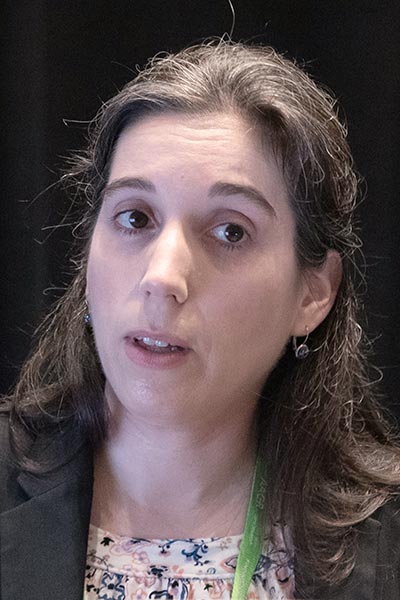Workshop explores opportunities and challenges of AACR Project GENIE genomic data analysis
During Saturday’s methods workshop Utilizing AACR Project GENIE® Real-world Clinico-genomic Data, three panelists demonstrated specific applications of AACR Project GENIE genomic datasets and described how the increasing availability of large clinico-genomic datasets generated through routine cancer care affords the opportunity to conduct precision oncology research using observational data at scale.

The session can be viewed on the virtual meeting platform by registered Annual Meeting participants through July 19, 2023.
Alexander S. Baras, MD, PhD, Associate Professor of Pathology, Urology, and Oncology, and Director of Pathology Informatics at Johns Hopkins University School of Medicine, discussed how to leverage GENIE data to flag putative assay artifacts and calibrate estimates of exomic mutation burden.
Baras is using the dataset to characterize basic concepts of assay concordance and to devise approaches for calibration of exome-derived tumor mutational burden (TMB) from panel data.
“Previous studies have suggested standardization and calibration to exome-derived TMB. However, with TMB cutoffs in some settings being developed from panel data, there is a need to understand how to best estimate exomic TMB values from panel assays,” Baras said.
He explained that key sources of bias in panel data are subsampling of the genome focusing on more commonly mutated regions and artifactual contribution of certain germline variants in tumor samples that do not have a matched normal control. Genetic ancestry significantly affects tumor-only data and will need to be accounted and modeled for, he said. Factors to account for include the degree of representation of certain populations in databases and the underlying degree of genetic variability present in those populations.
“I think it’s important for us to understand the heterogeneity of these assays, analyze them with a lot of scrutiny, and understand where there is concordance and where there is not,” Baras said. “Moving forward, we need to have a holistic process on how to approach high-variance mutations and how to cover the basic biases that are present in estimating exomic TMB.”

Amin H. Nassar, MD, Hematology/Oncology Fellow at Yale New Haven Hospital and Yale University Cancer Center, expanded on the use of Project GENIE data to aid in ancestry-driven recalibration of TMB, and how genetic ancestry may influence TMB calculation.
“Genetic ancestry presents the possibility of uncovering the continuum of human populations, and pan-cancer studies of genetic ancestry in The Cancer Genome Atlas (TCGA) have identified ancestry-associated features across many cancer types,” Nassar said.
Unfortunately, TCGA included few individuals from non-European populations and only limited outcomes data from an outdated clinical context, he noted.
“It’s important to remember that race does not equate to genetic ancestry,” Nassar said. “Further, racial and ethnic categorization of individuals ignores the continuum nature of human populations, particularly in the U.S. where many understudied populations are admixed.”
In studying and comparing datasets from different cohorts of patients, Nassar said it’s clear that standardization and harmonization of TMB measurement across test platforms are important to the successful implementation of TMB in clinical practice.

Tali Mazor, PhD, Associate Director and Lead Scientist, Knowledge Systems Group, Dana-Farber Cancer Institute, concluded the session with a discussion of the GENIE Biopharma Collaborative (BPC) and a demonstration of the cBioPortal platform for exploring the BPC colorectal cancer dataset and other public datasets.
The BPC is designed to collect clinical data at scale using a consistent framework for systematically defining real-world endpoints, such as progression-free survival, disease-free survival, and treatment-based intervals. The cBioPortal platform, Mazor said, provides exploratory and interactive visualization and analysis of large-scale cancer clinico-genomics datasets, making complex cancer -omics data accessible and interpretable for cancer biologists and clinicians.
“The BPC collects all data at a granular level, which can then be aggregated as needed, and is comparable to other, similar real-world datasets and contemporary clinical trials,” Mazor said. “Precision medicine, broadly, and precision oncology, specifically, needs as many clinically annotated, genomically profiled patient samples as possible.”
Ultimately, she said, the goal is to continue to expand clinical annotation in the datasets to provide a more complete picture of each patient’s experience with cancer.
More from the AACR Annual Meeting 2025
View a photo gallery of scenes from Chicago, continue the conversation on social media using the hashtag #AACR25, and read more coverage in AACR Annual Meeting News.

